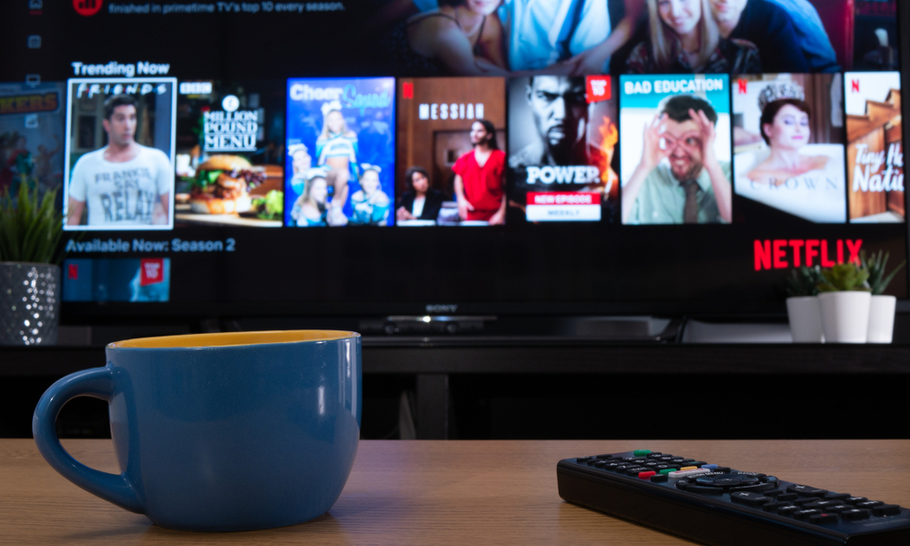Streaming in the time of coronavirus

(Shutterstock)
Last week, yet another streaming service launched in the UK. Disney+ arrived here packed full of superheroes, Star Wars and, of course, Mickey Mouse. In total, it makes available over 600 films and television programmes, spanning 83 years of work. But it also arrived faced with a huge problem — how to supply content to the millions of people who are now locked-down in their homes and desperate for some escapism?
Disney+ and its streaming rivals are having to reduce the bandwidth they operate on and, in some cases, degrade the video quality being offered. It comes as European broadband networks struggle to cope with the increased demand from millions of homeworkers and their bored children. Disney+ said that it was reducing its bandwidth use by 25 per cent in order to help. Not exactly how the service would have liked to announce itself in the UK and six other European territories.
Others are doing the same. On the back of a request from the EU, Netflix, Amazon Prime Video and Apple TV+ have all announced that they are narrowing their bandwidth. YouTube, meanwhile, is offering standard definition, not high definition, as part of its bid to help. Netflix explained that video quality should still be maintained but “we’ve simply removed the highest bandwidth streams”. Even the BBC iPlayer cannot escape this burden. It has removed the option to stream things in Ultra High Definition in all but a few cases.
Not only are the streaming services struggling, but production work on their original content has been postponed. Industry leader Netflix has temporarily halted production on Stranger Things and Lucifer, as well as new work that it had in the pipeline. For Disney+, work on forthcoming series from the Marvel comic book franchise like Loki, The Falcon and the Winter Soldier has been stopped. Amazon appears to have been hit the least by production pauses. To date, work has only ceased on Carnival Row and The Wheel of Time.
These productions delays are a shame for fans, but a particular business problem for Apple. The tech giant is still trying to prove it can make its way in the TV game. The Apple TV+ service only has originals, some good (The Morning Show)… some not so much (See)… Consequently, it has a limited catalogue to offer customers. If it can’t top this up with the second series of programmes and releases of new films I suspect people are going to get bored of it relatively quickly. The thing in Apple TV+’s favour is that most people are not paying for it yet.
If you bought an iPhone, iPad or computer from Apple in recent months you will be entitled to a year free, so most people don’t need to make a financial calculation when deciding whether or not to keep the service. While that probably means people will stick with it for now, whether they decide to pay once their free year ends remains to be seen.
Given that so many businesses and their employees are suffering in these difficult times it is hard to muster much sympathy for technology giants. The companies, and many of their employees, are more than secure. In fact, they arguably become more vital with every passing day — there’s a reason why Amazon is hiring thousands of new workers in its delivery depots. Netflix will surely need more engineers to keep the show on the road.
So deep do these firms’ pockets go that they are, rightly, making donations to help during the crisis. Apple has donated $15 million worldwide towards efforts to fight coronavirus. Small change perhaps to a company that, depending on what day it is, can be valued at $1 trillion. Apple has also put its extensive operations capabilities to work and has donated 10 million masks for US healthcare workers, and millions more for those in Europe. Netflix, meanwhile, has donated $1 million to a film and TV emergency relief fund to help those in the industry whose incomes have been wiped out by the pandemic. Those are just small examples of how these firms are deploying their power and resources to help out.
We in the Western world, particularly those of us who live in major cities, are used to reliable high-speed internet access and high-quality video being available in the blink of an eye. It is just one of the many things that we have learned we cannot take for granted during this pandemic.
Despite all these problems, the services are still available and there is plenty to watch. So, if you’ll indulge me, I thought I’d build on the great list from David Herman and share some of my own favourite things to stream:
Brooklyn 99 (Netflix) — Silly, uplifting show set in a Brooklyn police precinct. Series six arrived this weekend.
The Morning Show (Apple TV+) — The tale of a US morning talk show and the battle for power at the top of a TV network, staring Jennifer Aniston, Reese Witherspoon and Steve Carrell.
Dickinson (Apple TV+) — A quirky, sexy, ride through the life of the poet Emily Dickinson.
The original Star Wars trilogy (Disney+) — What better time could there be to travel to a galaxy far, far away?
Noughts and Crosses (BBC iPlayer) — A powerful recreation of the Malorie Blackman novel.
The Bold Type (Amazon Prime Video) — Follows the lives of three young women trying to make it at a New York fashion magazine.





